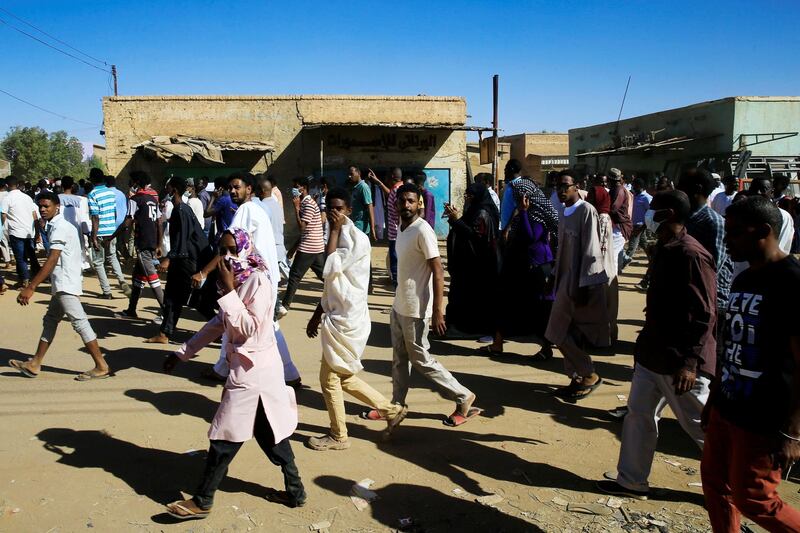Across Sudan, pharmacists have shuttered their stores, doctors are only admitting emergency cases, and the dentists are on strike. The head of the doctors’ union is in prison, as is his deputy and several members of the group’s executive committee. Several more doctors and medical students are hospitalised with gunshot wounds.
So far 40 demonstrators are reported to have been killed and over 1,000 detained since nationwide anti-government protests began on December 19. Alongside medical practitioners, lawyers, teachers and engineers are leading calls for long-standing autocrat Omar Al Bashir to step down.
On Sunday, the Sudanese Professionals Association, an umbrella group of unions and syndicates, organised protest marches in five cities across Sudan, including two in the Darfur region for the first time.
Protests began on December 19 after the government cut subsidies and the price of bread rose from one Sudanese pound to three (from about 7 fils to 23). The government says the cuts were necessary to cut a deficit after Khartoum lost three quarters of its oil revenue following the secession of South Sudan in 2011.
But protesters struggling to make ends meet say the real problem is much broader economic mismanagement and corruption. Nadreen Rugheem, a 28-year-old doctor from Khartoum, says her government salary is just 1500 Sudanese pounds monthly (Dh116) and she depends on her family for support. “Other doctors have to exhaust themselves at three to four jobs to survive,” she said.
In Khartoum, police fired tear gas to disperse protesters on Sunday, who chanted “peace, peace” and “revolution is the people’s choice”.
Footage shared on social media showed protesters marching through the streets in other cities.
#Sudan: Anti-regime protests have also spread to #Darfur today.
— Thomas van Linge (@ThomasVLinge) January 13, 2019
Protesters are calling for peaceful revolt in the southern city of #Nyala.#مدن_السودان_تنتفض#تسقط_بس pic.twitter.com/dDWBZtVMqX
After security forces stormed a hospital in Omdurman last week firing live ammunition, organisers expected protests to be met with violence.
“Since last night people have been donating blood at hospitals,” said Rania Alsayegh, a member of the Central Committee of Sudan Pharmacists. Ms Alsayegh spoke on behalf of the group because she is living in safety in the United Kingdom. “We think that whoever speaks to you will get arrested on the same day,” she said.
Mr Bashir describes the protests as a foreign plot to sow insecurity and has pleaded with his countrymen for time to resolve the country’s economic woes. Protesters describe his 29-year-rule as a kleptocracy and say their patience is worn out.
“People are fed up and eager for change,” said Samahir Elmubarak, a Sudanese pharmacist who was willing to speak on record.
Protests would continue until Mr Bashir steps down, she said. “Unless this regime is gone, prospects of stability are not on the table. Civil wars and genocides have been the regime’s way of staying in power for decades, corruption along with failed economic policies have made it impossible to expect stability.”
Meanwhile, high military spending which previously went towards putting down rebellions in Darfur, South Kordofan and Blue Nile State is now being directed towards crushing protests. “Sudanese people pay for the government to oppress them,” Ms Rugheem said, as the government is “using 70 per cent of our taxes on their military expenditure”.
That estimate is mirrored in a 2015 report by The Sentry, a Washington DC-based organisation that monitors conflict funding. Officially the Sudanese government allocated 14 per cent of its spending to defence in 2018, but economists say military expenditures are often disguised under other budget lines.
“Part of the problem in Sudan is that there’s been too much focus on regime survival at the expense of everything else,” said Murithi Mutiga, deputy project director for the Horn of Africa at the International Crisis Group. “Little else is left to fund social spending, healthcare, education and the rest of it.”
This, says the Sudan Doctors’ Syndicate, is why Mr Bashir must step down. “The different professional associations and trade unions have joined the call for these peaceful protests to object [to] the unprecedented collapse of the public sector and the lack of public services provision in the public facilities,” it said in a statement on Saturday.
_______________
Read more:
Sudan protests continue despite police crackdown
[ Sudanese lose hope for justice for shot and detained protesters ]
Persistent protests testify to deep-rooted anger in Sudan
_______________
The fact that professional classes form the backbone of the protest movement is significant, says the Crisis Group’s Mutiga. “It’s not coming from the periphery but from the riparian heartland of NCP support,” he said, referring to the ruling National Congress Party and its base along the River Nile. “In 1985, it was the professional classes who decided they had had enough, they went on strike and mobilised the protests.”
Like now, protests in 1985 were sparked by increasing food prices. Two weeks of demonstrations and strikes then led to a military coup which brought down the 15-year government of President Gaafar Al Nimeiry.
If Mr Bashir refuses to step down another military coup is a possibility, says Mr Mutiga. “If there’s a hostile coup it could open up almost a Libya scenario,” he warned, referring to the chaos which has engulfed the North African nation since the ouster of strongman Muammar Qaddafi in 2011.
But, like the former Libyan dictator, Mr Bashir remaining in power appears unsustainable, Mr Mutiga said, suggesting that a managed transition could avoid bloodshed.
“Now the government is saying they sympathise with the protesters, but they have no answers to the problem," he said. “Because fundamentally Bashir symbolises the self-dealing and unaccountable elite which has brought Sudan to this point.”





